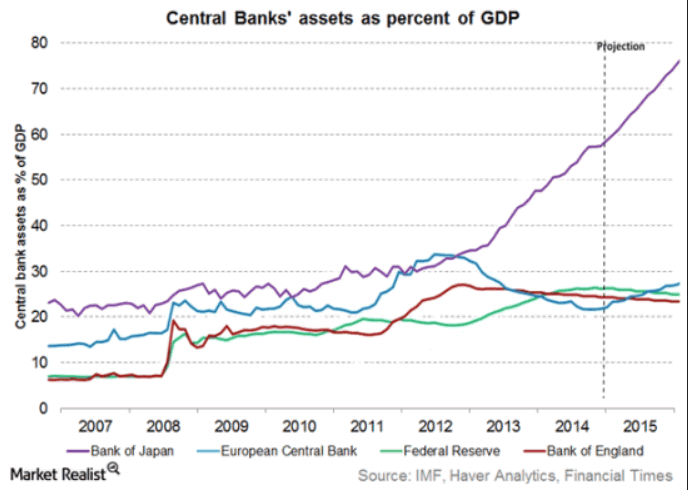Central Banks Fool The Markets Again, But Only For A Little While
Stock-Markets / Financial Markets 2016 Feb 16, 2016 - 10:50 AM GMTBy: John_Rubino
 Over the weekend, the following happened: China’s exports and imports fell by 11.2% and 18.8%, respectively, numbers which, for a trading power, are nothing short of apocalyptic. Japan’s Q4 GDP shrank at an annualized rate of 1.4% which, for a country that had spent the previous three years borrowing and printing record amounts of new currency, is an extraordinary admission of failure. And US allies Turkey and Saudi Arabia appeared to be invading Syria, putting them — and by implication the US — in direct confrontation with Russia.
Over the weekend, the following happened: China’s exports and imports fell by 11.2% and 18.8%, respectively, numbers which, for a trading power, are nothing short of apocalyptic. Japan’s Q4 GDP shrank at an annualized rate of 1.4% which, for a country that had spent the previous three years borrowing and printing record amounts of new currency, is an extraordinary admission of failure. And US allies Turkey and Saudi Arabia appeared to be invading Syria, putting them — and by implication the US — in direct confrontation with Russia.
This combination of disturbing trends and events would, you’d think, produce a dark and chaotic opening for Monday’s global financial markets. But you’d be wrong, because while the above was going on, Mario Draghi, head of the European Central Bank announced that he “will not hesitate to act” to keep the past month’s instability from spreading. And traders responded the way they’ve been trained to, with panic buying of pretty much every dicey financial asset and panic selling of safe havens like gold, Treasury bonds and euros.
This came after previous attempts by central banks — including China’s yuan devaluation and Japan’s foray into negative interest rates — failed to get the markets’ juices flowing. So why did Draghi succeed? Three reasons:
1) He has a history of this kind of thing. Recall his 2012 “whatever it takes” promise that ignited the most recent leg of the global asset bubble. So despite the fact that he doesn’t actually do much, traders seem to find the ex-Goldman Sachs banker’s words inordinately comforting.
2) One of the things Draghi seems to be offering this time around is protection against Italy’s imminent banking system implosion. 18% of Italian bank loans are “non-performing,” i.e., not making payments. This is almost without precedent for a whole country and extremely rare for individual banks — usually the latter die before things reach this point. So if the ECB changes the rules to, for instance, allow Italian banks to use non-performing loans as collateral for new financing, that might keep them alive for a little while longer. Though at the cost of vastly increased taxpayer liabilities.
Traders of course don’t care about vague notions of future obligations, assuming that they’ll be inflated away or otherwise forgiven by some future Super Mario. So the prospect of bank bailouts is, to them, an unalloyed good thing.
3) It was time for a counter-trend rally. The first six weeks of 2016 were among the worst starts to a year ever for stocks and junk bonds (and among the best ever for safe havens like Treasuries and gold). Trends don’t go in a straight line; instead they take two steps forward and one step back, repeating those dance steps until the cycle ends. So traders were waiting for an excuse to buy suddenly-cheap bank and tech stocks.
Based on past experience, the pop might endure for another few days or even weeks. But then the abject failure of recent central bank experiments will once again start to color perceptions. To take just a couple of examples: Four years after Draghi’s “whatever it takes” boast, Italy, as previously mentioned, is imploding and Deutsche Bank, Germany’s dominant financial institution, is releasing a drumbeat of bad/ominous news including escalating losses, massive lay-offs and flat-lining divisions. It is now being mentioned in the same breath as Lehman Brothers.
Japan, meanwhile, offers a useful clue about the effectiveness of whatever the ECB and for that matter the Fed might try next. The money it has pumped into the economy, as measured by central bank assets — the bonds and stocks it has bought with newly-created yen — rose from 25% of GDP in 2007 to nearly 80% today. But the Japanese economy has gone exactly nowhere. For a great recap of the wasted effort that is QE, see $12.3 trillion of QE has added up to…this?

In short, the limits of this kind of monetary policy are now visible for all to see. Despite differing levels of ease, all the major economies are performing pretty much the same way, with slow to slightly-negative growth, steadily increasing debt, and spiking asset price volatility. More QE is unlikely to change that.
So…what next? Probably a brief respite from “risk-off” followed by the resumption of turmoil (financial, geopolitical or both). Into this breach will step the US Fed because, as Deutsche Bank noted today, only the Fed can do it:
By John Rubino
Copyright 2016 © John Rubino - All Rights Reserved
Disclaimer: The above is a matter of opinion provided for general information purposes only and is not intended as investment advice. Information and analysis above are derived from sources and utilising methods believed to be reliable, but we cannot accept responsibility for any losses you may incur as a result of this analysis. Individuals should consult with their personal financial advisors.
© 2005-2022 http://www.MarketOracle.co.uk - The Market Oracle is a FREE Daily Financial Markets Analysis & Forecasting online publication.



